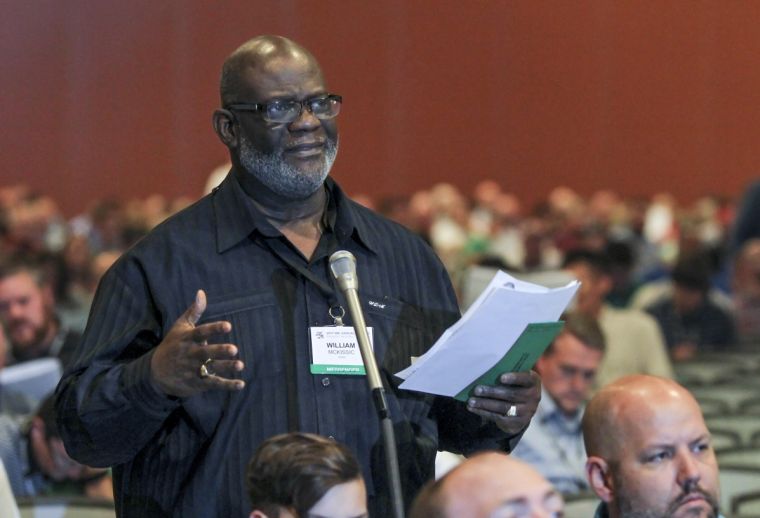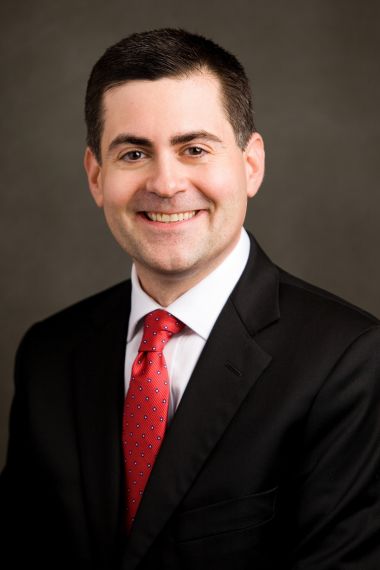Faultlines exposed as SBC avoids criticising Trump over 'moral leadership', delays vote condemning alt-right
For a statement on 'moral leadership' from a major church group, it arguably fell short by any normal standards. But the Southern Baptist Convention (SBC) – home to some 15.2 million members, prominent evangelical supporters of Donald Trump as well as occasional Trump critic Russell Moore – is undergoing an internal debate which reflects decline among its ranks and the reality that, under President Trump, these are far from normal times.

Yesterday, the SBC adopted a statement which both avoided pointed criticism of current holders of political office and delayed a proposal to condemn the racist, white nationalist 'alt-right' movement which helped see Trump elected.
The event in Phoenix is the first Southern Baptist annual meeting since the presidential election, ahead of which, in late 2015, Moore called evangelical support for the then Republican candidate – who in the end won 80 per cent of white evangelical support in the presidential election – 'illogical'.
Despite Moore's comments, which caused a backlash among other evangelical leaders, several prominent Southern Baptists became advisers to Trump's campaign, including Robert Jeffress of Dallas, and Jack Graham and Ronnie Floyd, who were both former presidents of the denomination.

Moore is due later today to address the convention, which comes against the backdrop of a stark decline in members for Southern Baptists.
In voting yesterday, the resolution on moral leadership urged church, government and business leaders to set a positive example and thanked public officials who 'displayed consistent moral character and uncompromising commitment to biblical principles'.
The background to the resolution goes back to Bill Clinton's presidency. A pastor had asked the convention to reaffirm a resolution on morality adopted in 1998, when Clinton was under investigation for his affair with the White House intern Monica Lewinsky. The pastor, Micah Fries of Chattanooga, Tennessee, proposed restating that 'serious allegations continue to be made about moral and legal misconduct by certain public officials' and 'character does count in public office'.
However, the resolution that was passed yesterday decried how leaders 'in every walk of life' had 'destroyed their careers' and 'brought shame' through mistaken moral choices. The statement also praised leaders who refuse to meet alone with members of the opposite sex other than their spouses, to avoid temptation, following controversial comments by the conservative Christian Vice President Mike Pence, who said he never eats alone with a woman other than his wife.
Barrett Duke, the SBC's resolutions committee chairman, said in a news conference afterwards that the resolution included some 'very specific language' for Southern Baptists.
Asked about the absence of Trump's name from the resolution on moral leadership, Duke said, 'There was no need to single out President Trump or anyone else. We simply believe the resolution stands on its own without bringing particular characters into it.'
Meanwhile, the resolution against the 'alt-right' had been proposed by the prominent African-American pastor Dwight McKissic of Arlington, Texas. McKissic's proposal was part of an effort by the SBC, which is the largest Protestant group in the US, to overcome its founding in the 19th century in defence of slaveholders.
McKissic's move was rejected by the Resolutions Committee, whose chair Barrett Duke told reporters afterward the panel spent a number of hours considering the proposal 'before we finally said we just didn't see a way that we could speak to the multiple issues that were raised in that resolution in a way that we felt would be constructive'. According to Baptist Press, he said the committee agreed with the resolution's point on racism, but thought it and other 'elements [in the proposal] already had been addressed recently' in Southern Baptist life.
A revised motion is set to come back to the meeting this afternoon.
McKissic's proposal represents divisions among Southern Baptists, not least over Moore. In March, Christian Today reported on how McKissic launched an impassioned defence of the embattled president of the denomination's Ethics and Religious Liberty Commission, and raised the spectre of racial division within the SBC.
McKissic wrote a blog post arguing that attacks on Moore for his trenchant criticisms of Trump and positions on religious liberty are led by white Southern Baptists who don't reflect the concerns of black people.
Moore's ERLC had been targeted by churches including Prestonwood Baptist Church in Plano, Texas, which has withheld $1 million in donations because of Moore's statements and positions. The SBC's Executive Committee has launched an investigation into why churches are refusing to support the ERLC. Furthermore, the Louisana Baptist Convention, part of the SBC, has called for Moore himself to be investigated.
McKissic said then: 'If Russell Moore cannot give a candid evaluation of Donald Trump without being publically humiliated and without white churches withdrawing and threatening to withdraw funds, and the Southern Baptist Convention and a state affiliate, launching an investigation, I pity the Black SBC officeholder who would dare whisper a word of disagreement on a Trump statement or action.'
The convention approved a resolution reiterating the Southern Baptists' long-standing opposition to gambling and urging Congress, as well as state and local governments, to halt all taxpayer funding that supports the pro-abortion group Planned Parenthood.
Also passed were resolutions calling on Southern Baptists to commit to at least 15 minutes a day of prayer and regular fasting as they are able, as well as petitions to God to grant revival and the salvation of millions of people.
The internal splits come at a time of decline for the Southern Baptists. Although recently released figures show that they gained almost 500 churches last year, while taking in more than $11 billion, the SBC lost almost 78,000 members in the past year, according to the Annual Church Profile.
Southern Baptists have now lost a million members since their peak of 16.3 million in 2003, and the denomination is down to its 'lowest baptisms since 1946; lowest membership since 1990; lowest worship attendance since 1996', according to historical analysis from New Orleans Baptist Theological Seminary.
'Virtually everyone who sees these figures will react negatively and lament the poor state of our churches, our lack of evangelistic fervor, and our increasingly irrelevant programs,' Frank S Page, president and CEO of the Executive Committee of the Southern Baptist Convention (SBC), told Baptist Press. 'Indeed, we all should.'
Whether the SBC's ambigious statement on 'moral leadership' and rejection of the proposed condemnation of the 'alt-right' will help its modernising course, and reverse its decline, remains to be seen.











